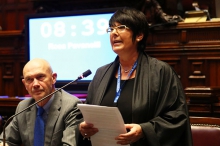EU Parliaments must remain vigilant on international agreements

"It's the role and responsibility of EU Parliaments to remain constantly and acutely vigilant on the consequences of trade agreements, and on the interests behind them, whether those agreements are about trade, development, human rights and living conditions of people inside and outside Europe,” said Pavanelli.
“We are not against trade agreements in principle, if they can bring sustainable growth and new jobs, in line with international labour standards. Still, PSI and many civil society organisations across the world are very concerned about the low level of transparency and democracy in the negotiation process.”
Pavanelli reminded the speakers that on 18 April there was a global day of action against TTIP and many people took part in demonstrations across the world.
“If we look at the Trade In Services Agreement (TISA), it is undeniable that transparency has failed so far, since we had to rely on leaks and investigative journalists to learn what is being discussed behind closed doors,” says Pavanelli.
The President of the EU Parliament Martin Schulz assured that the EU Parliament is committed to listen to people's and CSO demands about transparency. Yet he recalled the responsibilities of national parliaments in mandating their own governments engaged in the negotiations and he invited the speakers to discuss and open trade agreements to public debate.
"Our role is to ensure democracy and accountability in the negotiations," he said.
Pascal Lamy, former Director General of the WTO, admitted there is serious concern in Europe because trade agreements have different political and diplomatic implications for parliaments, also given the difficulties of the EU’s imperfect federalist structure.
"There is some political sensitivity because these treaties regard growth and the EU aims to balance protection for both the producers and the consumers," said Lamy.
Anouchka Van Miltenburg, president of Netherlands Lower House said that in the Netherlands TTIP has been under scrutiny, since the ratification process is still unclear and she emphasized how important it is that these deals are not done only in Brussels but in consultation with people at national level.
"We need to strengthen inter-parliament cooperation on trade agreements and a constructive and effective dialogue between national parliaments and the European Commission," she added.
Beyond TISA and TTIP
Rosa Pavanelli said, ”In many bilateral agreements between the EU and developing or emerging countries, from Africa to Latin America, fundamental human and labour rights are seldom a condition for the implementation of the agreement.”
In the aftermath of yet another horrific tragedy in the Mediterranean, where hundreds of migrants have died, she warned about the many risks of EU cooperation and development agreements with transit and sending countries to prevent migrants from reaching Europe.

